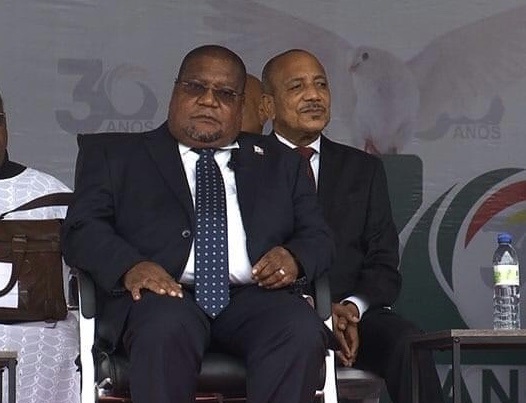Mozambique: Amnesty for protesters 'illegal' - president
DDR: Momade concerned over exclusion of Renamo officers – AIM

Photo: CanalMoz
Ossufo Momade, leader of Renamo, the largest opposition party in Mozambique, on Tuesday voiced his concern over the exclusion of 10 officers, who should to have already joined the Police force (PRM).
Apparently Momade was referring to those Renamo guerrillas who should have been recruited into the police force, under the Demobilisation, Disarmament and Reintegration (DDR) programme agreed between the government and Renamo
Momade expressed his concern in Maputo when delivering his speech during the celebrations of the 30th anniversary of the General Peace Agreement, signed in Rome on 04 October 1992, by the then Head of State, Joaquim Chissano, and the late Renamo leader, Afonso Dhlakama.
“On the DDR issue, we express our concern because 10 Renamo officers who should already be performing their duties at the General Command of the Mozambican Police (PRM) are yet to be demobilised,” said Momade.
He announced that 4,001 of the 5,254 guerrillas have already been demobilised under the DDR, but only 46 joined the police force.
“We agreed for 150 men to be incorporated, unfortunately the programme has stalled for a long time. Another concern is the delay in fixing of military pensions for former Renamo fighters. Without any doubt, all these obstacles deeply threaten reconciliation and social harmony,” warned the Renamo leader.
To fix these issues, which threaten peace and reconciliation of Mozambicans, Momade calls for the full implementation of all agreements reached between the government and Renamo.
“It is our collective desire that the violations of further agreements should be avoided during the ongoing DDR programme. Thus, it is a matter of urgency we stay united to quickly deal with issues currently threatening peace in Mozambique, such as absolute poverty made worse by the high cost of living, mass unemployment and terrorism that is killing people and destroying the northern region of the country,” said Momade.
Once peace is achieved, according to Momade, it is crucial to preserve it with tangible actions to ensure maintenance of an environment of national reconciliation and social justice.
“Reconciliation presupposes mutual acceptance as Mozambicans, tolerance and peaceful political cohabitation,” Momade said, adding that “it is worrying that after 30 years of the Peace Agreement, we continue to witness persecution of political opponents or individuals critical of the system.”
According to Momade, there is a need to move away from all negative signs that threaten the Mozambican population, through the adoption of mechanisms for social inclusion and political tolerance.
“This is a moment to reflect on an agreement that has significantly marked our young democracy, hence we are called upon to remove any threatening signs, such as electoral fraud that has been the main reason for discord before and after electoral processes,” he said.
Momade also stressed that over the last 30 years Mozambique went through “a winding and difficult journey that has required a great deal of tolerance from our part, which is an unequivocal sign of the commitment we made on that date. That is why Mozambique is praised abroad as a good example of pacification.”












Leave a Reply
Be the First to Comment!
You must be logged in to post a comment.
You must be logged in to post a comment.